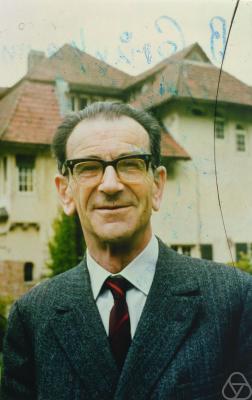Werner Fenchel (nonfiction): Difference between revisions
No edit summary |
No edit summary |
||
| (2 intermediate revisions by the same user not shown) | |||
| Line 5: | Line 5: | ||
Fenchel studied mathematics and physics at the University of Berlin between 1923 and 1928. He wrote his doctorate thesis in geometry (Über Krümmung und Windung geschlossener Raumkurven) under Ludwig Bieberbach. | Fenchel studied mathematics and physics at the University of Berlin between 1923 and 1928. He wrote his doctorate thesis in geometry (Über Krümmung und Windung geschlossener Raumkurven) under Ludwig Bieberbach. | ||
From 1928 to 1933, Fenchel was Professor E. Landau's Assistant at the University of Göttingen. During a one-year leave (on Rockefeller Fellowship) between 1930 and 1931, Fenchel spent time in Rome with Levi-Civita, as well as in Copenhagen with Harald Bohr and Tommy Bonnesen. He visited Denmark again in 1932. | From 1928 to 1933, Fenchel was Professor E. Landau's Assistant at the University of Göttingen. During a one-year leave (on Rockefeller Fellowship) between 1930 and 1931, Fenchel spent time in Rome with Levi-Civita, as well as in Copenhagen with [[Harald Bohr (nonfiction)|Harald Bohr]] and [[Tommy Bonnesen (nonfiction)|Tommy Bonnesen]]. He visited Denmark again in 1932. | ||
Fenchel taught at Göttingen until 1933, when the Nazi discrimination laws led to mass-firings of Jews. | Fenchel taught at Göttingen until 1933, when the Nazi discrimination laws led to mass-firings of Jews. | ||
| Line 16: | Line 16: | ||
On leave between 1949 and 1951, Fenchel taught in the U.S. at the University of Southern California, Stanford University, and Princeton University. | On leave between 1949 and 1951, Fenchel taught in the U.S. at the University of Southern California, Stanford University, and Princeton University. | ||
Fenchel lectured on "Convex Sets, Cones, and Functions" at Princeton University in the early 1950s. His lecture notes shaped the field of convex analysis, according to R. T. Rockafellar's monograph ''Convex Analysis''. | |||
From 1952 to 1956 Fenchel was the professor in mechanics at the Polytechnic in Copenhagen. | From 1952 to 1956 Fenchel was the professor in mechanics at the Polytechnic in Copenhagen. | ||
| Line 32: | Line 34: | ||
* [[Crimes against mathematical constants]] | * [[Crimes against mathematical constants]] | ||
* [[Gnomon algorithm]] | * [[Gnomon algorithm]] | ||
* [[Gnomon Chronicles]] | |||
* [[Mathematician]] | |||
* [[Mathematics]] | * [[Mathematics]] | ||
| Line 37: | Line 41: | ||
* [[Ludwig Bieberbach (nonfiction)]] - Doctoral advisor | * [[Ludwig Bieberbach (nonfiction)]] - Doctoral advisor | ||
* [[Harald Bohr (nonfiction)]] | |||
* [[Tommy Bonnesen (nonfiction)]] | |||
* [[Birgit Grodal (nonfiction)]] - Doctoral student | * [[Birgit Grodal (nonfiction)]] - Doctoral student | ||
* [[Troels Jørgensen (nonfiction)]] - Doctoral student | * [[Troels Jørgensen (nonfiction)]] - Doctoral student | ||
* [[Victor Klee (nonfiction)]] - Influenced | * [[Victor Klee (nonfiction)]] - Influenced | ||
* [[Mathematician (nonfiction)]] | * [[Mathematician (nonfiction)]] | ||
* [[Mathematics (nonfiction)]] | |||
* [[R. Tyrrell Rockafellar (nonfiction)]] - Influenced | * [[R. Tyrrell Rockafellar (nonfiction)]] - Influenced | ||
* [[Käte Sperling (nonfiction)]] | * [[Käte Sperling (nonfiction)]] | ||
External links: | External links: | ||
Latest revision as of 16:15, 6 May 2019
Moritz Werner Fenchel (German: [ˈfɛnçəl]; 3 May 1905 – 24 January 1988) was a mathematician known for his contributions to geometry and to optimization theory. Fenchel established the basic results of convex analysis and nonlinear optimization theory which would, in time, serve as the foundation for nonlinear programming. A German-born Jew and early refugee from Nazi suppression of intellectuals, Fenchel lived most of his life in Denmark. Fenchel's monographs and lecture notes are considered influential.
Fenchel was born on 3 May 1905 in Berlin, Germany. His younger brother was the Israeli architect Heinz Fenchel.
Fenchel studied mathematics and physics at the University of Berlin between 1923 and 1928. He wrote his doctorate thesis in geometry (Über Krümmung und Windung geschlossener Raumkurven) under Ludwig Bieberbach.
From 1928 to 1933, Fenchel was Professor E. Landau's Assistant at the University of Göttingen. During a one-year leave (on Rockefeller Fellowship) between 1930 and 1931, Fenchel spent time in Rome with Levi-Civita, as well as in Copenhagen with Harald Bohr and Tommy Bonnesen. He visited Denmark again in 1932.
Fenchel taught at Göttingen until 1933, when the Nazi discrimination laws led to mass-firings of Jews.
Fenchel emigrated to Denmark somewhere between April and September 1933, ultimately obtaining a position at the University of Copenhagen. In December 1933, Fenchel married fellow German refugee mathematician Käte Sperling.
When Germany occupied Denmark, Fenchel and roughly eight-thousand other Danish Jews received refuge in Sweden, where he taught (between 1943 and 1945) at the Danish School in Lund. After the Allied powers' liberation of Denmark, Fenchel returned to Copenhagen.
In 1946, Fenchel was elected a member of the Royal Danish Academy of Sciences and Letters.
On leave between 1949 and 1951, Fenchel taught in the U.S. at the University of Southern California, Stanford University, and Princeton University.
Fenchel lectured on "Convex Sets, Cones, and Functions" at Princeton University in the early 1950s. His lecture notes shaped the field of convex analysis, according to R. T. Rockafellar's monograph Convex Analysis.
From 1952 to 1956 Fenchel was the professor in mechanics at the Polytechnic in Copenhagen.
From 1956 to 1974 he was the professor in mathematics at the University of Copenhagen.
Professor Fenchel died on 24 January 1988.
In the News
Fiction cross-reference
Nonfiction cross-reference
- Ludwig Bieberbach (nonfiction) - Doctoral advisor
- Harald Bohr (nonfiction)
- Tommy Bonnesen (nonfiction)
- Birgit Grodal (nonfiction) - Doctoral student
- Troels Jørgensen (nonfiction) - Doctoral student
- Victor Klee (nonfiction) - Influenced
- Mathematician (nonfiction)
- Mathematics (nonfiction)
- R. Tyrrell Rockafellar (nonfiction) - Influenced
- Käte Sperling (nonfiction)
External links:
- Werner Fenchel @ Wikipedia
